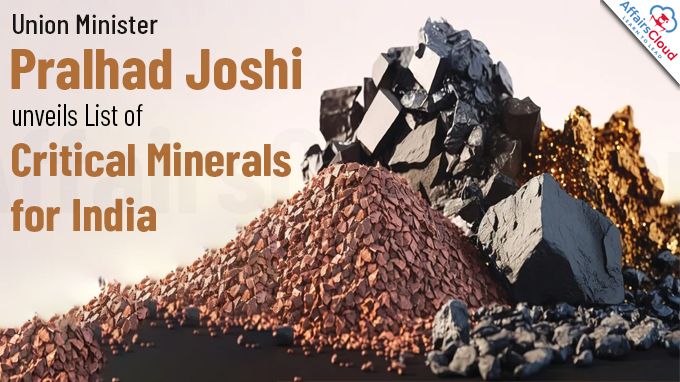
On 28th June 2023, Shri Pralhad Joshi, the Union Minister of Mines, released the first-ever report on “Critical Minerals for India” which was constituted by the Ministry of Mines. This landmark report identifies 30 essential minerals crucial to sectors such as defence, agriculture, energy, pharmaceuticals, and telecom. The comprehensive list marks a significant milestone for India, aligning with the nation’s Atma Nirbhar Bharat (self-reliance) roadmap.
Note: Shri Pralhad Joshi also acting as Cabinet Minister for Ministry of Parliamentary Affairs and Ministry of Coal
About the report on “Critical Minerals for India”:
i. The report sheds light on the indispensable role of these critical minerals in driving economic development and ensuring national security. Industries such as high-tech electronics, telecommunications, transportation, and defence heavily rely on these minerals.
ii. Additionally, the identified minerals play a vital role in facilitating the global transition to a low-carbon economy and supporting renewable energy technologies, aligning with worldwide ‘Net Zero’ commitments.
List of identified minerals: Antimony, Beryllium, Bismuth, Cobalt, Copper, Gallium, Germanium, Graphite, Hafnium, Indium, Lithium, Molybdenum, Niobium, Nickel, PGE, Phosphorus, Potash, REE, Rhenium, Silicon, Strontium, Tantalum, Tellurium, Tin, Titanium, Tungsten, Vanadium, Zirconium, Selenium and Cadmium.
Note: Alongside identifying the critical minerals, the committee recommended the establishment of the Centre of Excellence for Critical Minerals (CECM) within the Ministry of Mines whose primary purpose is to periodically update the list of critical minerals for India, devise the critical mineral strategy, and undertake various functions aimed at developing an efficient value chain for these minerals.
Outcomes:
- The introduction of the report on critical minerals signifies a significant stride for India, providing a clear roadmap for strategic planning, policy formulation, and investments in the mining sector.
- By identifying these critical minerals, India aims to enhance its self-sufficiency and meet the requirements of key sectors contributing to its economic growth and national security.
Background:
Recognizing the importance of identifying and establishing value chains for critical minerals, the Ministry of Mines constituted a committee in November 2022, led by the Joint Secretary (Policy), Ministry of Mines. Through thorough deliberations, the committee meticulously determined the list of critical minerals.
Additional Info:
Furthermore, India’s recent inclusion in the Mineral Security Partnership (MSP) during Prime Minister Narendra Modi’s visit to the United States further strengthens the nation’s critical mineral supply chains.
About Ministry of Mines:
Cabinet Minister – Shri Pralhad Joshi (Constituency : Dharwad in Karnataka)
Ministers of State – Shri Danve Raosaheb Dadarao




